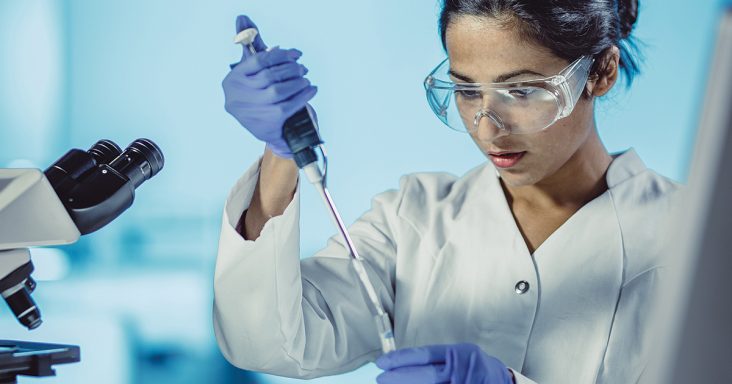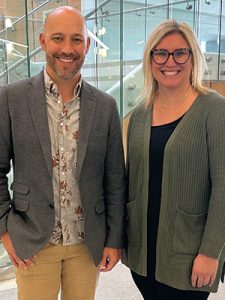University of Arkansas project aims to train low-skilled workers for lucrative biomanufacturing jobs in 2 weeks
by October 29, 2023 9:02 am 2,909 views

Female Scientist Working in The Laboratory
A University of Arkansas leader said that low-skilled workers can be trained for biomanufacturing jobs paying $50,000 to $60,000 annually in as little as two weeks. That is the expectation for a $1 million project to establish a biomanufacturing workforce development program in Arkansas as leaders look to attract industry employers.
Toby Teeter is a co-principal investigator for the UA project. He’s also director of the Collaborative, the university’s education and research presence in Bentonville, supporting the state’s innovation ecosystem.
“The driver behind this project is the opportunity of attracting a very large-scale employer,” Teeter said. “Our task was to go find a way to develop a workforce. That’s the chicken and the egg. We’re hoping to create the momentum that will bring one or more employers that we can feed using this lever, this opportunity where the University of Arkansas will quickly stand up a workforce development pathway to upskilling workforce.”
The UA recently received a $493,521 grant from the U.S. Department of Commerce’s Economic Development Administration to support the project. The matching grant will allow the UA to develop and implement free online and hybrid biomanufacturing curricula and credentialing.
The project includes hiring an instructional designer to develop the curriculum and establishing biomanufacturing workforce development centers. The two-year grant will support at least three centers in Arkansas, with the first at the Collaborative. It’s expected to open by the end of March in a 1,800-square-foot space at 700 S.E. Fifth St. in Bentonville.
After the curriculum is developed, the UA will distribute the free online training program to high schools, workforce development centers and two-year colleges across the state. Students who complete the training can receive a biomanufacturing micro-credential.
The workforce development centers will offer advanced training, and those who complete it will receive a unique credential. The centers will have virtual reality equipment, allowing students to train as if they’re in a $15 million lab. Teeter said the grant will provide scholarships for the first 60 students, covering the licensing fees.
“We do aspire to collaborate with others to develop a true workforce development center with machinery that could go as far as co-officing with a biomanufacturing employer,” he said. “That will be determined exactly where that will be located in the coming years. But to kickstart the growth of this industry here in Northwest Arkansas is the development of the workforce training.”
Teeter said a biomanufacturing employer has been looking to establish operations in the state, and the UA is collaborating with Bentonville investment firm Symbiosis to help with this. He said the venture capital firm has invested in about 35 early-stage biomanufacturing startups globally and has been working with the UA for at least the past year.
“The opportunity here is to relocate an incumbent in the biomanufacturing space to the state of Arkansas,” he said. “There is a concentrated effort afoot to bring one or more biomanufacturing companies to Arkansas, particularly Northwest Arkansas. The gap that we’re trying to fill is workforce development.”
FRONT-LINE WORKERS
Teeter said those who complete the biomanufacturing program will be trained to be technicians or front-line workers. He noted that the advanced training is expected to be available in the evenings for those with day jobs.
He said the training capacity will be unlimited, but the goal is to time the training as new positions become available. The UA Global Campus Professional and Workforce Development office staff will oversee the training at the workforce development center in Bentonville.

According to the Bureau of Labor Statistics, 73,710 people are employed as biological technicians in the United States and earn an average of $53,560 annually. The scientific research and development services industry has more biological technicians than any other industry. Its 22,280 biological technicians earn an average of $57,310 annually.
The agency’s data, as of May 2022, show Arkansas has 410 biological technicians earning an average of $48,150 annually. Northwest Arkansas has 40 biological technicians.
NASCENT SECTOR
According to a UA news release, biomanufacturing uses biological systems to produce commercially important biomaterials and biomolecules for medicines, food and beverage processing, and industrial applications.
“It’s very broad, but the processes are very similar,” Teeter said. “It’s classic lab work. You’re talking about measuring out things. You’re separating, using turbines rotating out molecules…And reproducing biomass in the lab and making that into a pill form or injectable for a prescription.”
He said that biomanufacturing is one of the fastest-growing biotech subsectors and is the scaling up of products comprising human, animal or plant cells. In this project, the UA is focused on the human component. Teeter added that the UA’s Institute for Integrative & Innovative Research is centered on the intersection of food and healthtech.
“It’s very adjacent to this workforce development grant,” he said. “You’re starting to see a theme here where the Northwest Arkansas corridor is emerging to become an innovation corridor. We aspire to build something close to the research triangle in North Carolina where corporate- and university-led innovations start to fold into each other and produce economic development regarding capital investment and job creation.”
Teeter said Arkansas has lagged other states in job creation and capital investments in fast-growing, high-paying sectors such as biotech, cleantech and energytech.
Teeter and project co-principal investigator Tara Dryer, senior managing director of the UA Global Campus Professional and Workforce Development, recently toured a biomanufacturing workforce development center at Texas A&M University that’s creating hundreds of jobs paying from $50,000 to $60,000 annually. Like UA’s program, he said the training can be completed in two or three weeks.
“That is the stunning opportunity here is to take the low-skilled workforce — somebody working even at fast food or straight from high school — and through a couple of weeks of a micro-certificate be a functional cog in a biomanufacturing process where someone’s making $50,000 to $60,000 a year wearing a white coat and producing product,” Teeter said. “It’s an opportunity to bring a new sector to our state and region.”
STATEWIDE EFFORT
Including Symbiosis, the UA is also partnering with the Arkansas Department of Commerce’s Office of Skills Development on the project. The state agency will provide $80,000 in marketing to promote the project statewide.
Cody Waits, director of the Office of Skills Development, highlighted the project’s significance, including:
- The career opportunities it will provide Arkansans.
- The economic impact of bringing biomanufacturing companies to the state.
- The enhancement of quality of life.
“We see many people changing careers right now for several different factors,” Waits said. “I see the marketing aspect as being a good tool to inform people of Arkansas about what these opportunities look like, how to get involved, how to access training dollars, and what types of employers might be available and what types of jobs, wages, earning potential that you can make should you choose a career in that industry.”
He said the state has invested heavily in manufacturing and pointed to the growing steel industry and the Arkansas Steelmaking Bootcamp in northeast Arkansas. There, a steel manufacturing workforce development program can be completed in a similar timeframe as the biomanufacturing program, and the pay is like the biomanufacturing jobs.
Also, Dryer said that information technology jobs offer great pay, but the industry’s workforce development programs take longer than two weeks to complete.
“For such a short training program, this is a great starting wage,” Dryer said.
